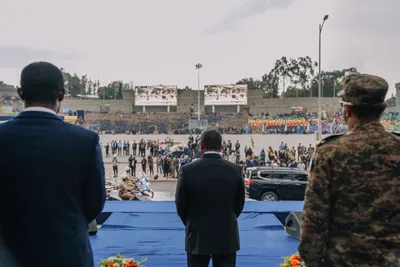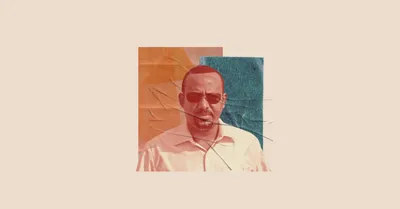Gadaa: Symbol of Democratic and Peaceful Society
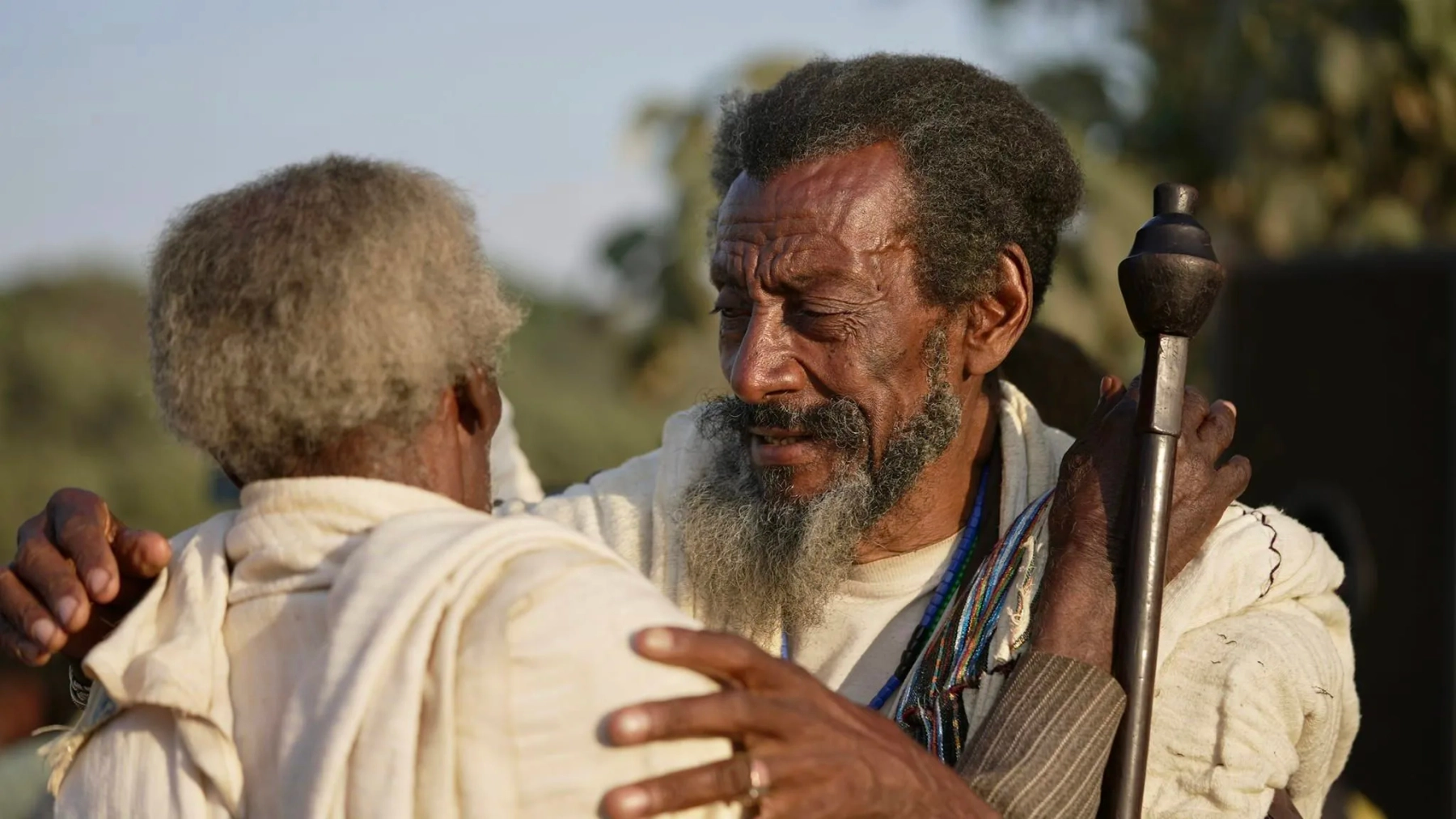
Two Guji Oromo elders exchange greetings during the power transfer ceremony at Me’ee Bokkoo in Southern Oromia on February 21, 2024. Source: Visit Oromia.
“Baallii tana yoo fuudhullee gammadee, yoo kennullee gammada.”
“I rejoiced when I assumed the Baallii [the position of being a Gadaa leader], and I rejoice when I transfer it to the next as well.”
Outgoing Abba Gadaa, Jilo Mando, on the power transfer ceremony on Feb. 21, 2024.
On February 21, 2024, the 75th Guji Oromo Gadaa power transfer was peacefully concluded, demonstrating the democratic nature of the Gadaa system and signifying the people’s commitment to peace. The peaceful power transfer, the promulgation of laws and reaffirmation of existing laws on a wide range of issues encompassing humans and non-humans confirms the fact that Gadaa system is built on fundamental values such as peace, equality and dignity of all human beings and non-humans alike.
The Oromo people have been practicing the Gadaa system of generations (lubaa) and age set governance since time immemorial. 1 Asmarom, Legesse. (1973). Gada: three approaches to the study of African society. New York, NY: The Free. Moreover, Gadaa embodies Oromo worldviews, wisdom and ways of life and regulates the people’s relations with itself as a society and with others. 2 Megerssa, Gemetchu., & Kassam, Aneesa. (2020). Sacred Knowledge Traditions of the Oromo of the Horn of Africa. Acknowledging its democratic principles and practices, as well as its adherence to the equality and the dignity of both human beings and the natural world, the United Nations Educational, Scientific and Cultural Organization (UNESCO) registered the Gadaa system in the list of the Intangible Cultural Heritage of Humanity in 2016.
Since the late 19th century, Ethiopia has had several regimes that have subjected the Oromo people to assimilation policies, state-sanctioned restrictions, and the imposition of an alien administrative system which in turn limited the practice of the Gadaa system to a small area of Oromo territory. Among the few Oromo clans who have kept the Gadaa intact for many generations are the Guji.
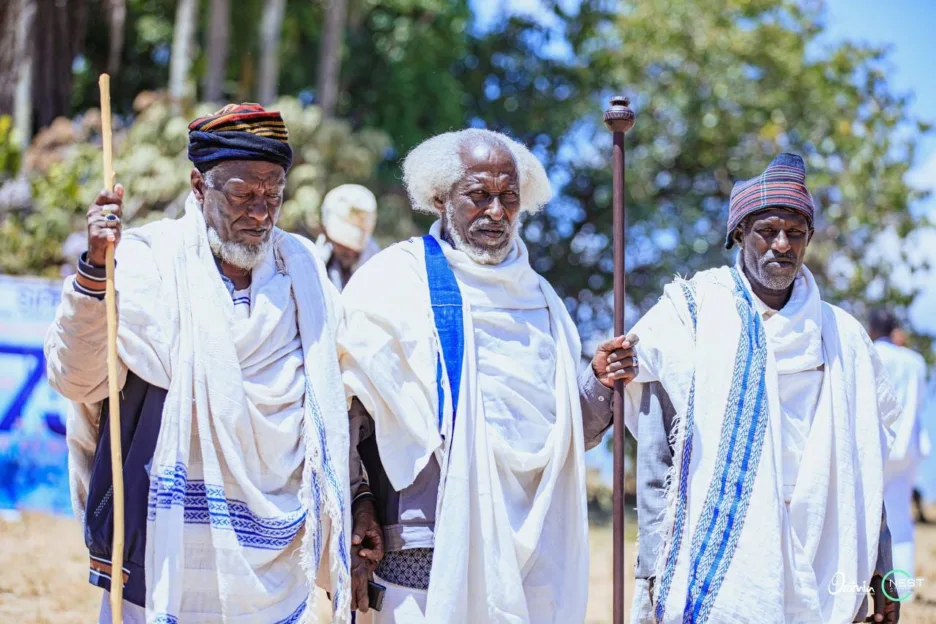
The Guji Oromo have two moieties: Kotomaa and Daarimu. The Guji Gadaa has seven balbala/Gabalaas or constituencies based on sub-clans called Gabalaa Gadaa. These are Uraagaa, Maattii, Hookkuu, Haloo Mokkonnaa, Weessituu, Oottuu and Sheelloo.
In addition to this, in Guji Gadaa, there are five Baallii or parties, namely: Roobalee, Muudana, Halchiisa, Dhallana, and Harmuufa each of which assume power every forty years alternating every eight years. The transfer of power takes place democratically and peacefully at the sacred space called Me’ee Bokko, in the East Guji zone, Southern Oromia.
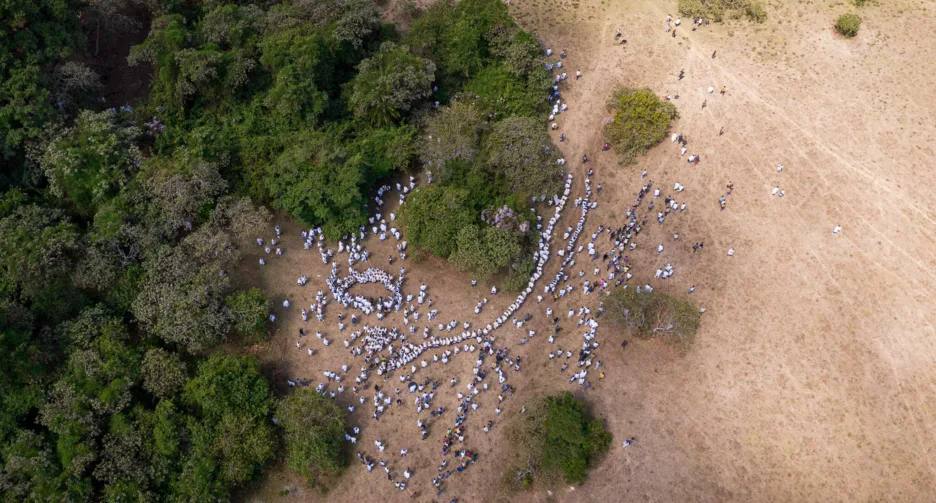
Guji Oromo’s relation with itself as a community, with other societies, non-humans and the supernatural power (Waaqaa) is embedded within the fundamental values of the Gadaa system – respect, equality and dignity. 3 Regassa, Asebe. (2017). Competing Epistemologies: Conservationist Discourses and Guji Oromo’s Sacred Cosmologies. Journal for the Study of Religion, Nature & Culture, 11(2).
Similarly, in the Guji Gadaa system, if one of the five Baallii takes over the administrative power (Gadaa), the remaining four are the two Qadadduu (a party that supports the incumbent party) and the two are Wallanna (opposition party).
The Qadaadduu and Wallaana serve in creating a check and balance whereby the Qadaadduu support, complement and fill the gaps of the incumbent Abbaa Gadaas, and the Wallaana oppose, critique, and expose the shortcomings of the incumbent. The check and balance designated in such a system helps to govern the community democratically.
The Baallii transfer was historically conducted in different Arda Jilas (sacred sites) but it has been conducted at Me’ee Bokkoo for the last 600 years.
The 75th Guji Baallii (power) transfer from Harmuufa to Roobalee took place where the Gumii (general assembly) gathered at the sacred site called Ardaa Jilaa Me’ee Bokkoo from February 14-21, 2024.
During the week-long ceremony ahead of the Baallii transfer, different activities were carried out. On the first and second days (i.e., February 14th and 15th) of the Gumii, Qorbisa (public hearing) was conducted. With the exception of culturally approved restrictions, such as those imposed on women who are menstruating or on people who have committed a sin but have not yet atoned for it, the Qorbisa public hearing is open to the whole public including children and women. Its purpose is to evaluate or review the performance of the outgoing Abbaa Gadaas’s term in order to prevent recurrence of those mistakes by the incoming Abba Gadaas.
For instance, in the public hearing in the 75th power transfer, one woman complained that despite informing the Abba Gadaa about her husband’s violence on multiple occasions, they failed to address the issue, and that she believes she was not given justice. Even non-Oromo residents who live among Gujii Oromo have the right to express their views during this assembly on the positive or negative aspects of the leaders.
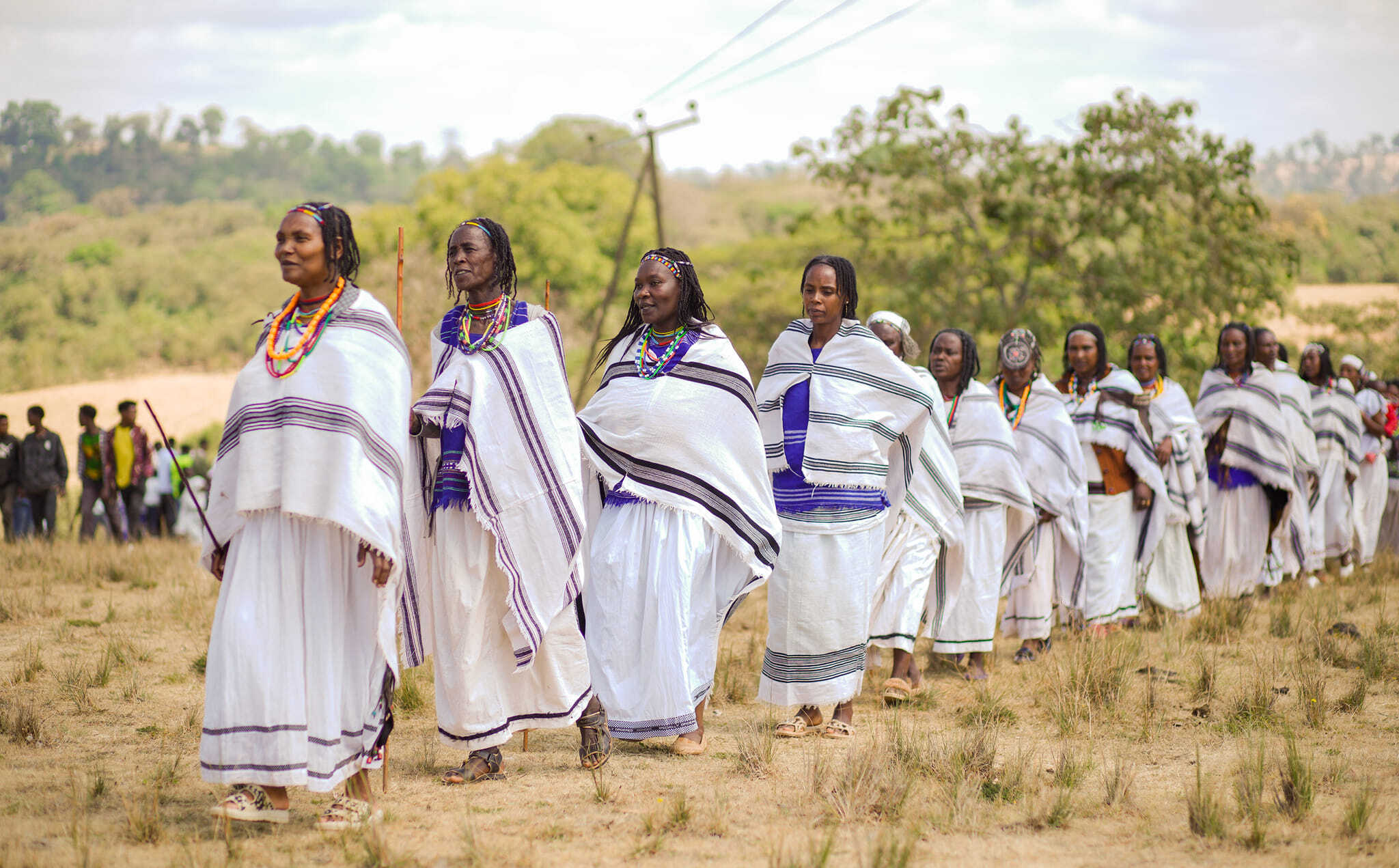
On the third, fourth, and fifth days, the Gumii proclaimed different laws and affirmed existing laws, customs, and values. Three proclamations are generally declared on these daysn, namely: the Gooroo (values), Seera (laws) and Aadaa (Customs).
The Gooroo declaration is an affirmation of values that everybody ought to obey, that is essential for humans and non-humans and that are not to be transgressed. The values, laws and customs are proclaimed by elders who retired from the Gadaa power. Three immediate generations after the Gadaa grade called Baatuu, junior Yubaa and senior Yubaa are responsible for this task. Thus, the Gooroo is announced by the Baatuu, who resigned from office eight years ago, while the laws and customs are announced by the senior and junior Yubaas, respectively. For instance, the Baatuu proclaimed the following:
| Waaqni Wayyuu, gooroo! | God is Sacred! |
| Lafti Wayyuu, gooroo! | The Earth is Sacred! |
| Intala fincaan fuudhanii, gooroo! | You shall check the clan of a girl you propose for marriage, this is natural! |
| Gujiin Gujii hin ajjeesu, gooroo! | A Guji shall not kill a Guji! |
| Oromoon Oromoo hin ajjeesu, gooroo! | An Oromo does not kill an Oromo! |
| Intala hin gurguratanu, gooroo! | A girl should not be exchanged for money! |
Laws are proclaimed or reaffirmed to sanction people who transgress them and to maintain social harmony through the exercise of authority of Gadaa leaders. For instance, the following laws were proclaimed (reaffirmed):
| Intala durbaa hin butan, santu seera! | Abducting a girl is prohibited, that’s a law! |
| Yoo butan aad-male! | If one abducts, it is not the custom! |
| Namni bute sa’a 14 adabama! | He who abducts shall be punished with 14 cows! |
| Ilmi hin guddata, gooroo! | The son will grow up, that is natural! |
| Guddatu ni fuudhaa, aadaa! | Growing up, he will marry, that is custom! |
| Intalti ni guddatti gooroo! | A girl will grow up, that is natural! |
| Guddattu ni heerumtii, aadaa! | Growing up, she will marry; that is custom! |
| Ilmi abbaafi haadha kabajuun, aadaa! | For a child to respect father and mother is the custom! |
| Yoo kabajuu dhabe aad-malee! | If he doesn’t respect them, that is out of the norm! |
| Muki kabaja qabaa aadaa! | Trees are to be respected, that is the norm! |
| Muka muranii balleessuun aad-malee! | Cutting down trees and destroying them, that is out of the norm! |
On the same day, laws (Seera), were also proclaimed by the junior and senior Yubaa. On the days of the Assembly, the laws are commonly proclaimed in the morning from 10am to 12pm. There are two types of laws related to legal promulgation during the assembly. They are called the laws of nature and the laws of humans. For instance, among the law of nature declared on this day were:
| Waaqni Wayyuu, santu seera! | God is sacred; it is the law! |
| Lafti Wayyuu, santu seera! | The Earth is sacred; it is the law! |
| Ardaan jilaa wayyuu, santu seera | The Jila [ritual site like Me’ee Bokkoo] is sacred, it is the law! |
In the same vein the laws of humans was proclaimed as follows:
| Qaalluun wayyuu, seera! | Qaalluu [the spiritual leader] is sacred, it is the law! |
| Abbaan Gadaa Wayyuu, seera! | Abbaa Gadaa is sacred, it is the law! |
| Intalti aadaan heerumti malee hin gurguratanu, santu seera! | A girl is married according to custom, not exchanged for, that is the law! |
| Abbaa Gadaa fuuldura hin qaxxamuran, seera! | It is prohibited to bypass Abbaa Gadaa! |
Based on this, if a person is found to have violated this law, he/she will be punished according to the punishments prescribed in the laws.
On the sixth day, the outgoing Gadaa members went to Ganale River early in the morning to complete the process of hiding a mystical power called Haganaa that is believed to be given only from Waaqaa (God).
In the Guji Gadaa system it is believed that authority is received from two sources: the authority received from Waaqaa that takes place at Ganale and the authority obtained from humans, that is from the outgoing Abbaa Gadaa at Me’ee Bokkoo. At the end of his term, the Abbaa Gadaa puts his mystical power under the Gololcha Foqaa (a gorge) that is located at Ganale riverbank. After forty years, his sons (generational age sets) will take it from there upon assuming the Gadaa power.
The incoming Gadaa leaders will stay at Me’ee Bokkoo for a month and will move to Ganale to receive the mystical power their Gadaa fathers hid forty years ago. This mystical power is also conferred to the incoming Abba Gadaa by the Abba Qaalluu (the spiritual leader).On the other hand, the process of receiving legitimate power through the Gadaa constitution is conducted by wearing kallacha and putting Ostrich feather (barguda guchii) on the forehead of incoming Abbaa Gadaa at Me’ee Bokko that represent symbolic power of the Gadaa.
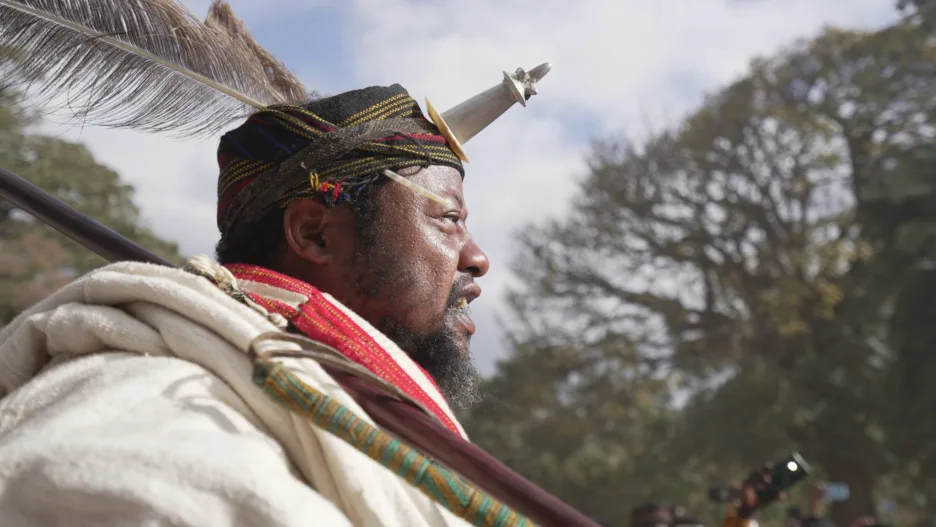
In contrast to the electoral authoritarianism that has defined successive Ethiopian regimes to date 4 Regassa, Asebe, and Getachew Tadesse. “Electoral Authoritarianism and the Question of Representation: The Case of Caffee Oromia, Ethiopia.” Representation 59, no. 2 (2023): 207-223. , the 75th Gadaa power transfer exemplifies the Oromo people’s commitment to peace, democracy, and the dignity of all human beings and non-humans. It also clearly demonstrates that unlike other ‘democratic’ practices under modern state systems, the Gadaa system promotes values of respect even among opposing Gadaa parties.
In contexts such as Africa, where elections can often lead to violence, much can be learned from the Gadaa system regarding the promotion of democracy and peace-building.
Footnotes
We need your support
We trust you found something of value in this article. If so, we kindly ask you to consider helping Curate Oromia continue its work.
If you believe in the importance of independent voices and honest reporting, we invite you to support our efforts through our GoFundMe campaign.
Every contribution, however small, goes directly to our writers and the expansion of our reach.
Thank you for your support.

